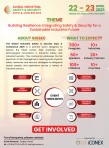- Gem and Jewellery Export Promotion Council Presents Pre-Budget Recommendations to Hon'ble Finance Minister
- Vishva Hindu Parishad announces nationwide public awakening campaign for liberation of temples from government control
- The AVTODOM Group team introduced partners to the advantages of the OMODA and JAECOO brands
- GT Scaffolding (Contractors) Ltd Expands Premier Scaffolding Services Across Surrey and Hampshire
- Tanishq Diamonds New Campaign Honours the Modern Woman’s Brilliance and Sparkle
- Innovative RMail Features for Lawyers Highlighted at The Florida Bar’s LegalFuel CLE Session
- Honda Motorcycle & Scooter India launches New 2025 Unicorn ‘Be A Wing Rider’
- CFlo World Limited Completes Restructuring to Pursue Public Market Listing in India
- Samay finally wears Spinny's T-shirt for a free car
- Briggs & Partner Ltd Expands Trusted Plant Hire Services Across West Yorkshire
- Justdial reveals Indian wedding services are witnessing a 21% nationwide surge in demand
- Panchjanya’s ‘Sagar Manthan’ 2024 Conclave showcases Goa’s governance excellence inspired by Atal Ji’s holistic values
- Kuku FM Celebrates New Year With A Massive Gift: 21,000+ New Audio Shows For Its 3 Million Paying Users
- DigitalBenz Annoyances Top-Notch SEO Services in Kolkata to Boost Local Businesses
- MMA Fight Store Launches Premium Hand Wraps for Ultimate Protection and Performance
 Mail to a Friend Mail to a Friend |
|
     |
Master Data Management Market Has Become an Important tool for Big Data: Research

Master data refers to central data that is essential for operations in a specific business or business unit. For any business, master data is the consolidated, synchronized information about customers, suppliers, distributors, and other entities associated with the organization. Master data management (MDM) comprises a comprehensive method that enables an enterprise to link all its critical data to a ?master file? for a common point of reference. It takes into consideration standards, policies, governance, processes, and tools that account for managing the organizational structure and consolidates the critical data to be available at a single point of reference.
Obtain the Brochure of Master Data Management Market:
http://www.transparencymarketresearch.com/sample/sample.php?flag=B&rep_id=4622
For such attributes, global master data management market has become an important tool to integrate data for big data, business intelligence (BI), and analytics solutions.With the increasing volume of business information, there is a surging need for a central data management system. Critical business data need to be properly verified and compliant with organizational statutes. Furthermore, high volume of information flow demands operational excellence. These factors collectively account for the rising adoption of master data management systems.Additionally, changing business processes such as consistent reporting and development of technologies such as Service-Oriented Architecture (SOA) and Software as a Service (SaaS) needs a central reference for data, which has stimulated the master data management market.
Data Governance to Integrate with Master Data Management Systems
Master data management (MDM) products are either designed for product information management (PIM), customer data integration (CDI), or for multiple data domains. By deployment, MDM solutions are distinguished as on-premise or cloud solutions.Cloud-based MDM is an emerging trend, with some of the prominent vendors, such as Orchestra Networks, offering MDM cloud support to complement on-premise software solutions. Data governance is regarded as a crucial element of satisfactory master data management systems. To attain such goals, companies such as IBM Corporation and SAP AG have set up business user committees to benchmark standards for international product codes and databases that involve global account structures.Further, to achieve such goals, corporations are engaging data stewards dedicated to identifying data issues and to oversee adherence to the set standards. As such, data quality is increasingly regarded as an integrated part of MDM systems.
MDM to be Offered as Specialty or Part of Larger Service Suites
The master data management market is significantly mature, with master data management techniques having been used for the last 10 years. Hence, a clear difference is emerging between MDM solutions offered as part of a larger platform and ones offered through specialist vendors.However, some of the established vendors, such as Teradata Corporation, Oracle Corporation, SAS Institute, Inc., IBM Corporation, Informatica Corporation, and SAP AG, emphasize the importance of MDM as a part of a broader solution.
Broadly, the global master data management market is classified on the basis of application, user type, and geography. On the basis of application, the market is segmented into customer data, product data, supplier data, and other data (sales, asset, employees, etc.). Based on user type, the master data management market is divided into large enterprises and small and medium business (SMBs).
Some of the key players in the global master data management market are Riversand Technologies, Inc., SAS Institute, Inc., Oracle Corporation, Orchestra Networks, and Stibo Systems.
Company :-Transparency Market Research
User :- Mr.Sudip S
Email :-sales@transparencymarketresearch.com
Phone :---
Mobile:- -
Url :- http://www.transparencymarketresearch.com/master-data-management-market.html











